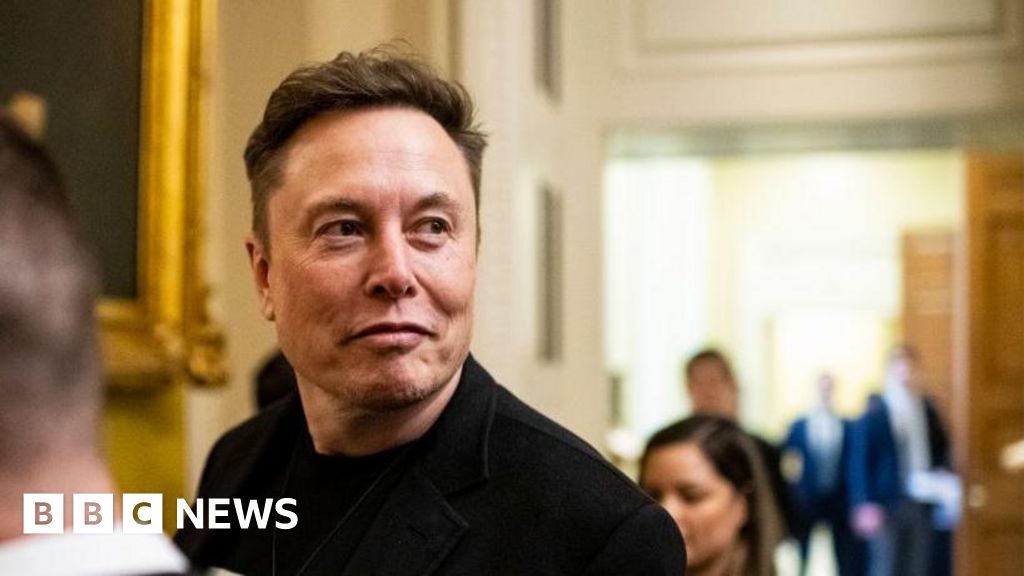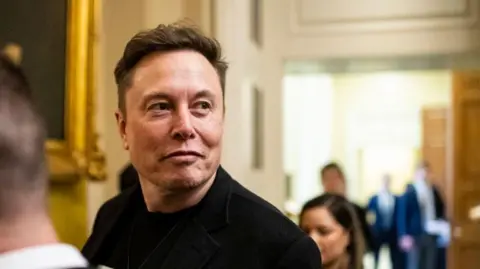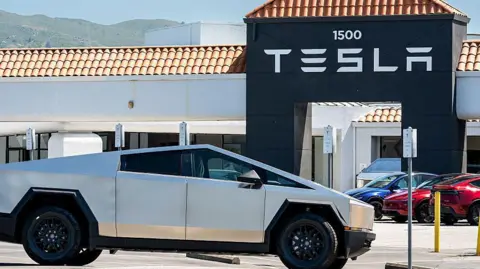Business
Tesla plans to pay Musk $1tn – do they really need him that much?

Lucy HookerBusiness reporter
 Getty Images
Getty ImagesA great leader is a huge asset for company, of course, but can anyone be worth $1 trillion?
That is the pay packet Tesla shareholders have approved for Elon Musk, as long as he meets the targets they have set over the next 10 years.
In the meantime he won’t collect a salary, but will presumably throw himself into his work with renewed vigour.
He was certainly buzzing with energy as he jigged around the stage at the carmaker’s Texas headquarters to rapturous applause, telling the audience that while other shareholder meetings were “snoozefests”, Tesla’s are “bangers”.
Musk has attracted an army of critics, upset that he sided with US President Donald Trump, wielding his chainsaw at government programmes, and wading into politics overseas with explicit support for the far right.
But he has an equally large following of admirers, people who believe in his vision and don’t doubt that he can achieve it.
It seems most of his shareholders are in this camp, after they backed his new remuneration package this week.
Of course shareholders signed up, says New York-based financial analyst Dan Ives. If Musk succeeds – and Ives thinks he will – he will have created trillions of dollars worth of shareholder value, ample payback for investors.
Ives sees Musk as a “modern day Albert Einstein, a Thomas Edison”.
Without the stupendous pay package, he says, there was a risk that within a few years Musk would have walked away, taking his Artificial Intellgience (AI) initiatives with him.
“Tesla without Musk is like pizza without cheese,” he says.
Ives does not own shares in Tesla, but analyses the company for his firm Wedbush Securities and thinks Musk’s “ability to go where others are not” means he may well achieve the targets that have been set.
“There’s edgy behaviour, there’s haters, but a lot of people love that. And that’s why he’s the richest person in the world.
“Does it help sell cars in Europe? No. But does it help Tesla win the AI race? Yes.”
 Bloomberg via Getty Images
Bloomberg via Getty ImagesMusk’s political activities have prompted a backlash from some customers, including demonstrations outside showrooms earlier this year.
But Matt Britzman at Hargreaves Lansdown in London, who has invested in Tesla, says the impact is a drop in the ocean when it comes to Tesla’s earnings.
Far from weighing on the firm’s valuation, he reckons around a third of the value of Tesla can be attributed to what he calls the “Musk premium”, value that wouldn’t be there without him.
“It’s a $1.4 trillion company, not based on the current car business. It’s a $1.4 trillion business based on expectations of what it can deliver over the next three years.”
And a lot of those expectations are fixed on Musk and his record of thinking big and thinking long term, he says.
The potential reward for Musk is as astronomical as his vision for space travel.
With $1 trillion you could buy 20 million Model Y Teslas, at around $50,000 each. Or you could buy yourself a $10m house every day for 250 years, and still have change for furnishing and decorating.
The conditions appear to be very testing, including delivering 20 million Tesla vehicles and one million robots. A million self-driving Robotaxi vehicles will also need to be on the roads.
Tesla’s overall market value will need to rise from its current $1.4tn to $8.5tn.
These are “incredibly high milestones”, says Ann Lipton, a law professor at the University of Colorado.
However, the board does have “discretion” to decide when some of them have been met, she adds.
“If intervening events prevent him from reaching the goals, the board can deem them met anyway.”
So the targets may not turn out to be quite as demanding as they appear.
There is also nothing in the terms, no constraint, that prevents Musk continuing to speak out about politics or anything else.
“Even after the pay package was proposed, he didn’t pull back from his political commentary,” adds Prof Lipton.
“So it seems to me that this pay package, whatever the goals are, however lofty they may be, they’re not going to inhibit him from involving himself in whatever matters he wants to be involved in.”
That freedom could pose the biggest risk, according to Stephanie Valdez Streaty, director of industry insights at car sector marketing and software firm Cox Automotive.
Musk is a visionary she says, but he’s also unpredictable, and it is possible that his other interests may distract him as they have before, leading him to neglect Tesla, which itself is already a smorgasbord of different businesses and challenges.
“I’m hoping that based on his experience with getting politically involved and how that really hurt some of his brand and sales that he has learned to really focus on this business.
“But that’s going to be the board’s responsibility,” she adds, “to make sure that he stays within the guardrails, and that he does what’s right for Tesla.”
And if he does, well the sky is the limit, or possibly Mars, for Musk’s ambition.
“People laughed when his 2018 pay package was approved,” says Prof Lipton. “And he hit those milestones well ahead of schedule.”
Business
SEBI Proposes Overhaul Of Gold And Silver ETF Price Bands After Sharp Swings

Last Updated:
SEBI proposes stricter base price and band rules for gold, silver ETFs, including cooling-off periods after sharp global price swings to curb volatility.


Amid Global Commodity Volatility, SEBI Plans New Price Band Rules for Gold, Silver ETFs
The market regulator has sought to curb extreme volatility in gold and silver Exchange Traded Funds (ETFs) by proposing changes to the base price and price band framework. Currently, there are no separate price bands for ETFs aligned with their underlying assets, making them vulnerable to sharp price movements.
The proposal comes after sharp volatility in gold and silver ETFs triggered by fluctuations in global commodity prices. On some days, these ETFs fell by over 15%, while on others, they recorded sharp gains.
Stock exchanges currently apply a fixed price band of plus or minus 20% on the base price of ETFs, except for Overnight ETFs investing only in TREPs, which have a price band of plus or minus 5%.
Moreover, the base price for applying price bands to ETFs is taken as the T-2 day closing Net Asset Value (NAV) by exchanges, instead of the T-1 day closing NAV or price, as is the case with indices and individual stocks. This creates a challenge, as the closing NAV of ETFs typically differs between T-1 and T-2 days. Corporate actions such as bonuses and dividends are adjusted manually, increasing the risk of errors.
What Are the Key Proposals?
SEBI has proposed that the base price be determined using either the closing price of the ETF on T-1 day (weighted average price of the last 30 minutes), the closing NAV of T-1 day, or the average indicative NAV (iNAV) of the last 30 minutes of T-1 day.
Further, the regulator has proposed an initial price band of plus or minus 10% for equity and debt ETFs, which can be flexed up to plus or minus 20%. A cooling-off period of 15 minutes will apply, and up to two flexes will be allowed in a day.
For gold and silver ETFs, the regulator has proposed an initial price band of plus or minus 6%, which can be flexed up to plus or minus 20%. This will also include a 15-minute cooling-off period.
February 14, 2026, 16:08 IST
Read More
Business
Petrol and diesel prices likely to rise – SUCH TV

Oil and Gas Regulatory Authority (OGRA) forwarded a summary to the federal government suggesting an increase of Rs4.39 per liter in petrol price for the next fortnight.
After approval from the federal government, one liter of petrol will be sold at Rs257.56 instead of Rs253.17 per liter.
The price of high-speed diesel (HSD) will be increased by Rs5.40 per liter.
After approval, the price of one liter of high-speed diesel will increase by Rs268.38 to Rs273.78.
The proposal to increase the price of kerosene by Rs4 per liter is also on the cards.
The OGRA also recommended increasing the price of one liter of light diesel by Rs6.55.
The new prices of petroleum products will be effective from February 16, 2026.
Due to tension between the USA and Iran, petroleum prices are likely to increase further.
Business
Rising vet costs leave Birmingham charity with £400k bill

The group, based in Solihull and Wolverhampton, says its vet bills are costing them more.
Source link
-

 Entertainment1 week ago
Entertainment1 week agoHow a factory error in China created a viral “crying horse” Lunar New Year trend
-

 Tech1 week ago
Tech1 week agoNew York Is the Latest State to Consider a Data Center Pause
-

 Business4 days ago
Business4 days agoAye Finance IPO Day 2: GMP Remains Zero; Apply Or Not? Check Price, GMP, Financials, Recommendations
-

 Tech1 week ago
Tech1 week agoNordProtect Makes ID Theft Protection a Little Easier—if You Trust That It Works
-

 Tech1 week ago
Tech1 week agoPrivate LTE/5G networks reached 6,500 deployments in 2025 | Computer Weekly
-

 Fashion4 days ago
Fashion4 days agoComment: Tariffs, capacity and timing reshape sourcing decisions
-

 Business1 week ago
Business1 week agoStock market today: Here are the top gainers and losers on NSE, BSE on February 6 – check list – The Times of India
-

 Business1 week ago
Business1 week agoMandelson’s lobbying firm cuts all ties with disgraced peer amid Epstein fallout






